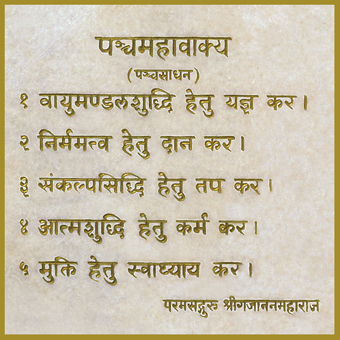The Fivefold Path


Yajnya (Agnihotra)

The Fivefold Path in Sanskrit
After Shree’s vow to resuscitate the Vedas, five guidelines were revealed to Him how His vow was to be fulfilled. Except yajnyas, these guidelines can essentially be found in every religion. Thus, one can regard the Fivefold Path as the basis of all religions and at the same time as a connecting link.
The Fivefold Path gives basic principles for a harmonious, God-connected life: Yajnya, Daan, Tapa, Karma and Swadhyaya. Even if it is only five steps, these are comprehensive. They offer help for a happy coexistence on earth.
1. Yajnya (Sanskrit: yajña, fire techniques)
Purification of the atmosphere in the visible and the invisible ranges by means of fire
All creatures on earth need air, water and food to live. But these resources are often polluted, which is a cause of many diseases.
The Vedas do not only emphasize the duty to keep one's life pure, but they also mention how an additional purification is possible. The purification primarily concerns the atmosphere, including the subtle aspect which influences our mind.
This purification process is possible through fire. Fire techniques were once known all over the world. However, their correct performance was no longer known, which is why they were abolished or forgotten.
Shree ensured that the pure, original fire techniques (Yajnya, Homa) were reintroduced. Their effects are based on the law of resonance:
Heal the atmosphere and the healed atmosphere will heal you.
The basic Yajnya is Agnihotra. It is carried out daily at sunrise and sunset. Yajnyas are a unique blessing for us and our environment.
2. Daan (Sanskrit: „dāna“, right giving)
Sharing of material goods with the inner attitude of humility
Clinging to material things and accumulation of property sometimes make us forget that every material thing is only a loan in time. To remind us, there is a simple way: sharing with others! For giving the right way, one should take the view that the recipient is the greater one, because he accepts our gift. The best thing to do is to give in secret, without expecting any thanks or gifts in return, and not only on special occasions. The "giving of alms" is anchored in almost all religions.
By practicing Daan, a spiritual principle is observed: giving and taking are balanced! A playful and joyful handling of material goods becomes possible; poverty can be countered. If Daan is properly practiced, it makes our mind free and independent of material things.
3. Tapa (Self-discipline)
The basic concept for spiritual exercises and disciplines to train the mind to react to all circumstances with love.
Tapa is used to describe exercises that make it easier for us to achieve our goal. For this, it is necessary to strengthen our will and mind. Breaking of established habits or a temporary renouncement of luxury food can make sense. What initially seems difficult will create inner strength later on. The freer we are of mental and physical circumstances, the more comfortable we feel and the easier it is to turn to God.
Tapa exercises also include spiritual disciplines such as silence and meditation, prayer and recitation of mantras. Through Tapa, we can transform our weaknesses into strengths and first control our minds, but later even put us into a state where a lasting happiness becomes possible.

4. Karma (right action)
Karma is a term for the cosmic law of cause and effect:
"You reap what you sow."
It implies that every thought, every feeling, and every action will lead to a corresponding reaction, and thus we shape our destiny. To do everything in humility and with love for God and not to depend on the results can free us from the negative effects of our actions.
5. Swadhyaya (self-study)
Study of Self: Who Am I? Striving to know our true, divine nature
Self-study enables an honest and sincere life. Not-so-good features can be detected and changed. The study of sacred scriptures and exercises of silence will help to better recognize the truth. A spiritual teacher can be of great help to practice Swadhyaya.
Realization and profound knowledge lie beyond words and can only be experienced.
Shree: "The understanding and following of the Fivefold Path
will lead to betterment and harmony for all created beings."



